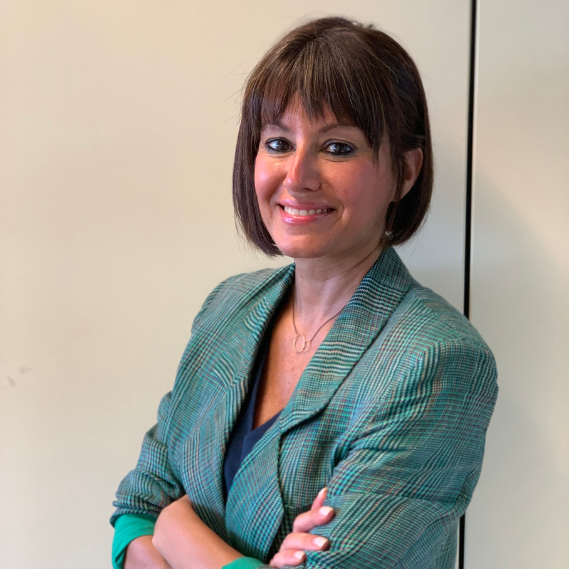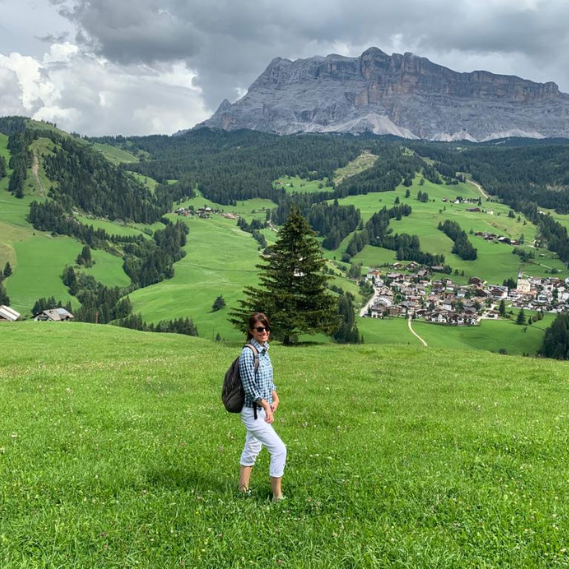Christina Giannakopoulou – Civil Infrastructures Business Unit – Construction Management, Central
Of all the women working at Leonardo Global Solutions, 23.4% have a STEM degree. One of these is Christina who, as a child, dreamed of being a civil engineer and now works in that very profession as head of Construction Management in the Real Estate Investment Centre.
Christina reminds us of the many examples of women who have made history, from the famous ones to the largely unknown ones, in every role and every part of the world, who strive day after day with professionalism, enthusiasm and determination not only for their own fulfilment and affirmation, but also for that of future generations of girls. It is a way of behaving that strips away stereotypes, and that is based on change as evolution and opportunity and the achievement of what seems too difficult and challenging. Like Christina, we too can be revolutionaries, each in our own small way, and help construct the social progress we wish to see.
What was your course of study and what do you think were the skills you acquired during those years that you still carry with you today?
After high school, I graduated in Civil Engineering in Athens in 1997 and from then on it has been a case of continuous professional development. I think it was always what I wanted to do when I "grew up": I always liked understanding how structures stay standing. I was interested in the environment and sustainability as well as the idea that an engineer can make a difference. My studies provided me with a solid foundation to be able to realise civil works and strategic infrastructures, so that I could follow all phases of the project life cycle, from design to execution, from renovation to routine and extraordinary maintenance, in compliance with the regulations in force.
I acquired both multidisciplinary technical skills and the ability to work in a team, preparing me to face and solve advanced problems and operate in the complex and diverse fields of civil engineering, including overseas. In fact, I remember with pleasure that, towards the end of a hard and demanding university degree, my colleagues and I were rewarded with an experience of almost two months abroad: an intensive course dedicated to wastewater treatment using the biological method in the United States, developed through a private agreement programme between my university and that of Pennsylvania.

What has your career path been so far? Of all your day-to-day work activities, is there one you feel most proud of?
After graduating, I spent a short period working in public and private construction. However, I was always attracted by the world of large-scale public civil engineering works, in Greece and then in Italy. My career in Italy began in 2001, first in the design of large strategic motorway works, then with Project & Construction Management of motorways (working on a series of initiatives both in Italy and abroad), which allowed me to grow professionally and, at the same time, enriched me by giving me the opportunity to overcome my personal limitations. Today, I continue to handle Project & Construction Management, but for Leonardo Global Solutions' Real Estate investments: I am head of Construction Management - Central, of the Organisational Unit for Real Estate Projects and Construction Sites. The objective is, in an integrated way, to manage and optimise all aspects relating to Real Estate in order to valorise the offices and industrial sites in the Central Area, by managing projects from the needs analysis phase right up to implementation and final delivery.
The skills I consider most needed in a profession like mine are project (and time) management, to ensure that deadlines for all activities are met, a penchant for analysis and an aptitude for problem solving, as well as an openness to teamwork. Ensuring the smooth running of the construction process, by monitoring and reporting on the various initiatives, is the most delicate and at the same time the most challenging part of my role. Performing it to the best of my ability is certainly something I am extremely proud of.
What does International Women's Day mean to you?
On International Women's Day, we should remember the social, economic and political achievements achieved at considerable cost by women of every nation, and let's not forget to denounce and combat discrimination and physical and psychological violence, as well as the social and physical segregation to which we are still subjected throughout the world.
However, I would like to see a time when it will no longer be necessary to celebrate it one day of the year, and only among women, but when instead it can be considered a true achievement of all mankind.
What do you think is the biggest challenge for a woman today compared to the past and what changes do you hope for so that in the future we can finally talk about gender equality at work?
The need to prove that she deserves equality, even without the help of social structures (when they exist), her family (when they allow it), her partner (when they agree), facing the responsibility of succeeding in all the roles in which she is now expected to contribute to civil, social, and economic progress, alone.
Women are an active part of society. I had the freedom to choose a profession culturally considered male, instead of just looking for a job (and a life) that at the time (and perhaps, even today) would have been considered more "suitable for a woman". The gender gap in the world of work still exists; I experience it every time someone chooses to call me "miss" instead of using my title "engineer".
Gender equality at work, and elsewhere, is a key element in combating discrimination in the world. The mere fact that there are still stereotypes, and that these are socially accepted "because that's the way it's always been", reflects the danger of a society incapable of evolution, positive change and progress because it is tied to an archaic model. A danger for everyone, not just for women.
A woman who has done something important for you and whom you would like to thank today?
I would like to thank not just one woman, but every woman: each one, in each role, deserves my gratitude. The many special women whom life has given me the opportunity to get to know and who attempt to bridge this profound gender gap with their determination. Our country was built by strong women, who will continue to challenge stereotypes, every day, until finally we can say we no longer need to do so.
What did you dream of as a child, and what you would say to that child today?
Time passes, people and conditions change, so it's possible to forget the promises you made to yourself. On your journey, you may realise the time has come to change direction, to take the risk of changing. As a child, you dreamed of being a civil engineer. You pursued your dream and made it happen. But it will never be enough, you will always have to nurture it with new stimuli and new goals.

What advice would you give to the next generation of professional women?
Charlotte Whitton wrote: "Whatever women do, they must do twice as well as men to be thought half as good. Luckily, this is not difficult." To the next generation of professional women, I simply say never doubt that you are valuable and powerful and deserve every opportunity in the world to pursue and realise your dreams. Women belong anywhere decisions are made. This should no longer be the exception.
Not flowers but?
True respect, not just "good manners". Equality will follow naturally from that.

